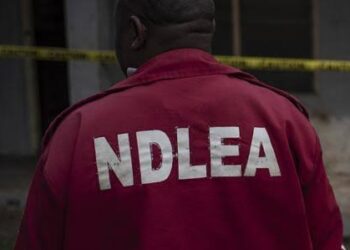Abdullahi M. Gulloma
In a move that was not entirely unexpected, the members of the South-east caucus in the Senate, recently, held a close-door meeting with President Muhammadu Buhari.
The Deputy President of the Senate, Mr Ike Ekweremadu and the caucus’ chairman, Mr Eyinnaya Abaribe, led the senators to the meeting, where it was believed that issues bordering on lopsided appointments, Indigenous People of Biafra (IPOB) and infrastructural development in the zone were discussed.
Though the Movement for the Actualisation of the Sovereign State of Biafra (MASSOB) claimed that it was its threat to organize an internal revolution against Igbo leaders that forced the senators from the South-east to meet with Buhari.
The MASSOB had recently accused the political, traditional, religious and opinion leaders in the Igbo land of not showing concern to the plight of the leader of the Indigenous People of Biafra (IPOB), Nnamdi Kanu, and other detained pro-Biafra activists.
Still, other indications have emerged that the South-east senators presented a list of demands to Buhari to fulfil for the Igbo. Otherwise, the people of the South-east threaten that their members in the National Assembly would oppose the President’s request for $29.9bn external loan needed to tackle the nation’s economic recession.
It was learnt that the South-east legislators were unhappy that the zone had nothing or little to benefit from the proposed external loan. Thus, there was little wonder that Ekweremadu, at the end of the meeting, said: “For us from the South-east, we believe that dialogue is better than any other form of engagement. So we decided to visit the president and present to him some of the concerns of the South-east including the issues of roads and infrastructure. We also discussed the issue of security with him and, of course the issue of IPOB. We had a good conversation and he promised to look into the issues. He has promised us that he is going to look into the problems of South-east. We know that there are problems everywhere but we also believe that the South-east is the zone that is far much short-changed at this time than other zones.”
Painfully speaking, Ekweremadu cannot be more factual. In fact, there seems to be no end in sight for cry about the neglect of the South-east geo-political zone by the President Muhammadu Buhari-led federal government. The region, in this year’s budget, received the lowest allocation for development projects.
According to details of the capital allocations for states as contained in a report of the National Assembly Budget and Research Office (NABRO), “the sum of N28.22bn was appropriated for capital projects for the five states in the region.”
A breakdown shows that: “Abia State got N6.93bn (24.55 percent); Anambra State got N3.02bn (10.20 percent); Ebonyi State got N4.63bn (16.41 percent); Enugu State got N10.15bn (35.98 percent) and Imo State got N3.49bn (12.36 percent).”
On the contrary, other zones, especially the North-west, got more than double of what the South-east got. Agreed, some rational factors were responsible for the glaring budgetary allocation imparity among the zones, the truth remains that the nature and conditions of the financial relations in any federal system of government are crucial to the survival of the system.
In a country like Nigeria, the populace would always be concerned with how the national pie is derived and shared among effortless federating entities. Regrettably, despite agitations from the federating units, hardly can there ever be found an acceptable sharing means.
In fact, it will translate into an economic miracle to have an acceptable sharing formula, even with the frightening level of agitations from the competing zones in the country.
It is desirable in a federal system such as ours to try and ensure equitable infrastructural development and create job opportunities in the federating units in order to check and control manipulation of the common peoples’ emotions and sentiments by some greedy and unpatriotic citizens.
Unquestionably, the poverty situation prevailing in the geopolitical zones is a serious issue, posing challenge to the country’s federation and adversely affecting its national development. It is argued that poverty and neglect by the authorities gave rise to the MASSOB, IPOB and Boko Haram in the North-east zone.
Yet, it is heartwarming to hear the South-east lawmakers say that the President has promised to do something about the predicament of the zone. In essence, holding this type of meeting with the remaining five zones, it can be said, will not only be helpful, but necessary.
Of course, there is need to say that the South-east states governors also need to pay more attention to the plight of their people. They must ensure proper utilization of resources at their disposal and essentially ensure that youth in the area are gainfully engaged.



